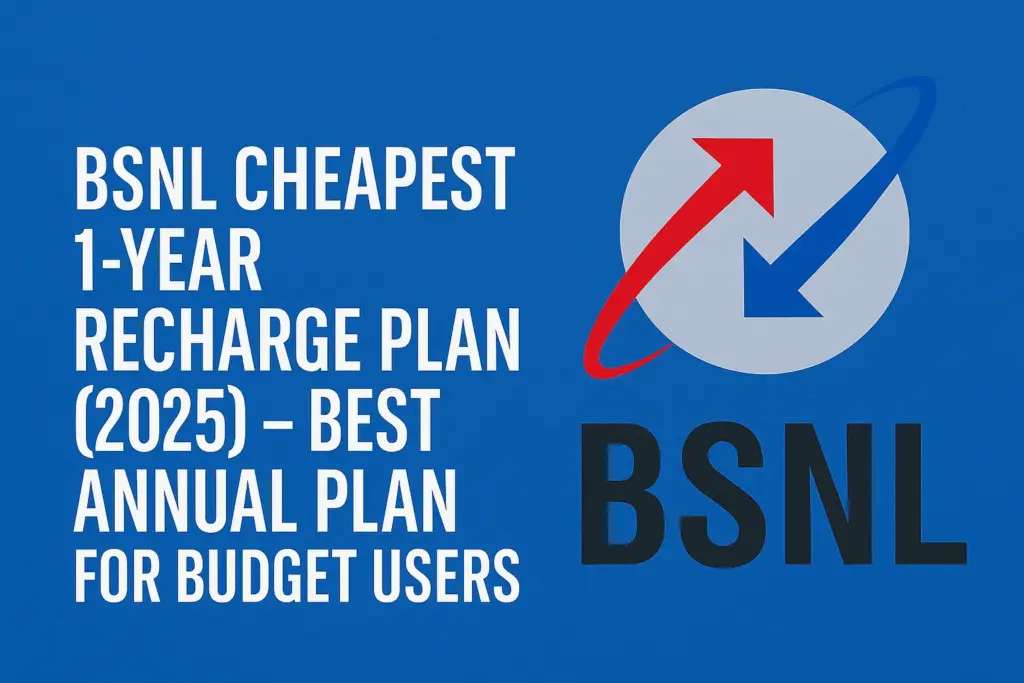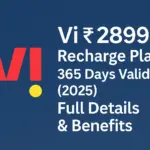Bharat Sanchar Nigam Limited (BSNL), India’s state-owned telecom operator, has long been recognized as a value-driven provider in the country’s mobile market. While private players like Jio, Airtel, and Vi often dominate the headlines with their high-speed 5G rollouts, BSNL continues to attract a large base of budget-conscious users, especially in rural and semi-urban areas.
For 2025, BSNL remains a strong option for those who prefer affordable long-term recharge plans that minimize the hassle of monthly recharges. Among its offerings, the cheapest 1-year recharge plan is a standout, providing a balance of cost savings, essential benefits, and wide accessibility for everyday users.
Overview of the Cheapest 1-Year Recharge Plan for 2025
BSNL’s annual prepaid plan in 2025 is designed to cater to users who want uninterrupted service for 365 days at a low cost.
- Plan Price: ₹1,799 (approximate; may vary slightly by circle)
- Validity: 365 days (1 year)
- Voice Benefits: Unlimited local and STD calls across all networks in India.
- SMS Allowance: 100 SMS/day, suitable for OTPs, banking, and light communication.
- Data Benefits: 2GB of high-speed data per day; once the daily limit is reached, the speed reduces to 80Kbps.
- Additional Perks: Free BSNL Tunes and access to select promotional offers in certain circles.
Note: Some BSNL circles offer promotional discounts or bundled benefits, so pricing and features may differ slightly depending on your region. Users should always confirm the latest details via the official BSNL website or customer care.
Benefits of the BSNL Plan: What You Need to Know
1. Cost Savings
At ₹1,799 for an entire year, this is one of the most affordable annual prepaid plans in India. On average, it costs less than ₹5 per day, making it an excellent choice for students, senior citizens, and light data users.
2. Hassle-Free Connectivity
With a 365-day validity, users don’t have to worry about monthly recharges. This is particularly useful for people in rural areas or those who want peace of mind with a single annual payment.
3. Sufficient Data for Light to Moderate Use
The 2GB/day high-speed data limit is more than enough for browsing, social media, video calls, and occasional streaming. Once the limit is reached, reduced speeds allow for basic messaging and browsing without extra charges.
4. Reliable Voice and SMS Services
Unlimited calling across networks ensures users remain connected without worrying about call charges. The 100 SMS/day quota supports both personal and transactional needs.
5. Wide Reach in Rural Areas
While BSNL’s 4G rollout is ongoing and 5G services are yet to be launched nationwide, BSNL still has one of the widest coverage footprints in rural regions, where other operators may have patchy availability.
Limitations and Considerations
While the BSNL 1-year plan is highly affordable, users should keep the following in mind:
- Network Speeds: BSNL’s 4G speeds can be inconsistent, especially in urban areas where private operators have advanced 5G networks.
- Data-Heavy Users: For users who stream in HD, play graphics-intensive games, or work remotely with large files, the daily 2GB data cap may feel restrictive compared to Jio or Airtel’s annual plans.
- Regional Variations: Benefits and pricing may differ slightly depending on the telecom circle. Always check with BSNL’s official sources before recharging.
Conclusion: Making the Right Choice for Your Mobile Needs
The BSNL ₹1,799 cheapest 1-year recharge plan (2025) is an excellent choice for budget users who prioritize affordability and essential benefits over high-speed 5G connectivity. With unlimited calling, daily SMS allowances, and enough data for light to moderate use, it offers everything most users need at a fraction of the cost charged by competitors.
For students, senior citizens, or rural users looking for maximum savings and reliable service, this plan is hard to beat. While it may not satisfy heavy data users or those seeking the latest 5G speeds, the BSNL annual plan remains a best-in-class option for cost-effective, long-term connectivity in 2025.


